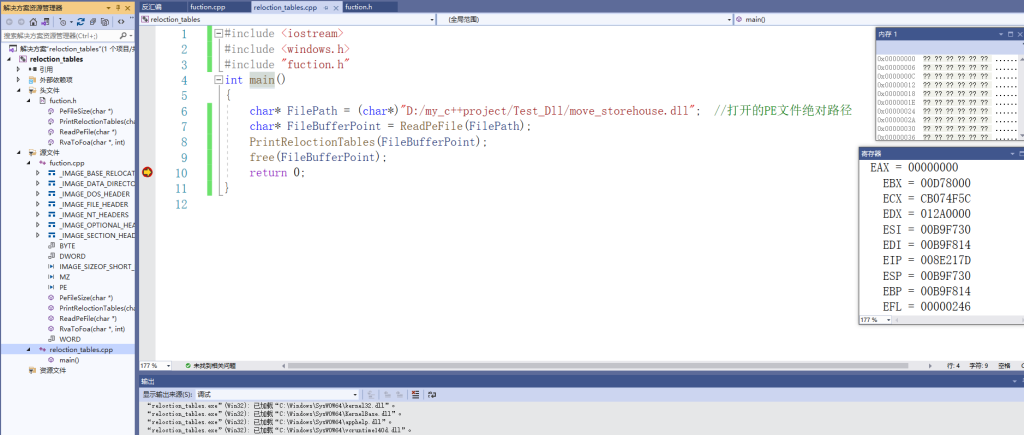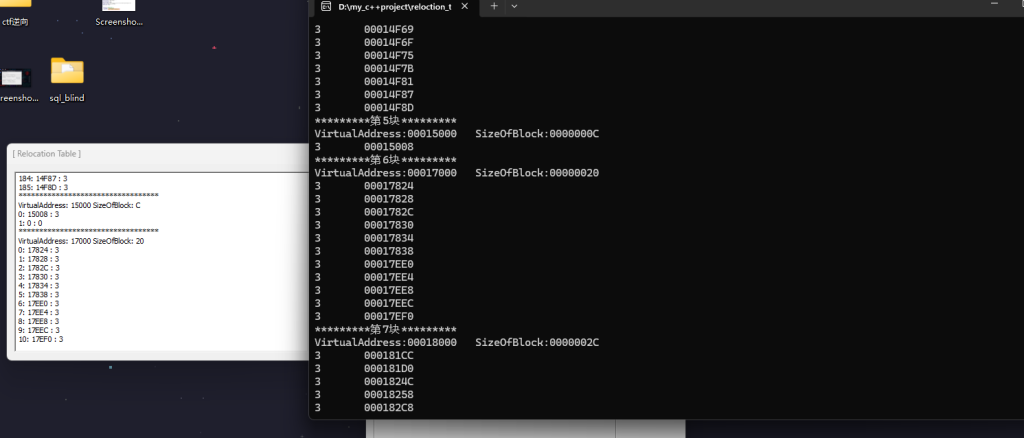就是写个小程序
1.项目的整体结构

2.各个部分的代码
main 函数
#include <iostream>
#include <windows.h>
#include "fuction.h"
int main()
{
char* FilePath = (char*)"D:/my_c++project/Test_Dll/move_storehouse.dll"; //打开的PE文件绝对路径
char* FileBufferPoint = ReadPeFile(FilePath);
PrintReloctionTables(FileBufferPoint);
free(FileBufferPoint);
return 0;
}
头文件
#pragma once
int PeFileSize(char* FilePath);
char* ReadPeFile(char* FilePath);
int RvaToFoa(char* FileBufferPoint, int RVA);
void PrintReloctionTables(char* FileBufferPoint);
功能函数
#include <stdlib.h>
#include <cstdio>
#include <atomic>
#include "Fuction.h"
typedef unsigned short WORD;
typedef unsigned int DWORD;
typedef unsigned char BYTE;
#define MZ 0x5A4D
#define PE 0x4550
#define IMAGE_SIZEOF_SHORT_NAME 8
typedef unsigned short WORD;
typedef unsigned int DWORD;
typedef unsigned char BYTE;
#define MZ 0x5A4D
#define PE 0x4550
#define IMAGE_SIZEOF_SHORT_NAME 8
//DOS头
struct _IMAGE_DOS_HEADER {
WORD e_magic; //MZ标记
WORD e_cblp;
WORD e_cp;
WORD e_crlc;
WORD e_cparhdr;
WORD e_minalloc;
WORD e_maxalloc;
WORD e_ss;
WORD e_sp;
WORD e_csum;
WORD e_ip;
WORD e_cs;
WORD e_lfarlc;
WORD e_ovno;
WORD e_res[4];
WORD e_oemid;
WORD e_oeminfo;
WORD e_res2[10];
DWORD e_lfanew; //PE文件真正开始的偏移地址
};
//标准PE头
struct _IMAGE_FILE_HEADER {
WORD Machine; //文件运行平台
WORD NumberOfSections; //节数量
DWORD TimeDateStamp; //时间戳
DWORD PointerToSymbolTable;
DWORD NumberOfSymbols;
WORD SizeOfOptionalHeader; //可选PE头大小
WORD Characteristics; //特征值
};
//数据目录
struct _IMAGE_DATA_DIRECTORY {
DWORD VirtualAddress;
DWORD Size;
};
//可选PE头
struct _IMAGE_OPTIONAL_HEADER {
WORD Magic; //文件类型
BYTE MajorLinkerVersion;
BYTE MinorLinkerVersion;
DWORD SizeOfCode; //代码节文件对齐后的大小
DWORD SizeOfInitializedData; //初始化数据文件对齐后的大小
DWORD SizeOfUninitializedData; //未初始化数据文件对齐后大小
DWORD AddressOfEntryPoint; //程序入口点(偏移量)
DWORD BaseOfCode; //代码基址
DWORD BaseOfData; //数据基址
DWORD ImageBase; //内存镜像基址
DWORD SectionAlignment; //内存对齐粒度
DWORD FileAlignment; //文件对齐粒度
WORD MajorOperatingSystemVersion;
WORD MinorOperatingSystemVersion;
WORD MajorImageVersion;
WORD MinorImageVersion;
WORD MajorSubsystemVersion;
WORD MinorSubsystemVersion;
DWORD Win32VersionValue;
DWORD SizeOfImage; //文件装入虚拟内存后大小
DWORD SizeOfHeaders; //DOS、NT头和节表大小
DWORD CheckSum; //校验和
WORD Subsystem;
WORD DllCharacteristics;
DWORD SizeOfStackReserve; //预留堆栈大小
DWORD SizeOfStackCommit; //实际分配堆栈大小
DWORD SizeOfHeapReserve; //预留堆大小
DWORD SizeOfHeapCommit; //实际分配堆大小
DWORD LoaderFlags;
DWORD NumberOfRvaAndSizes; //目录项数目
_IMAGE_DATA_DIRECTORY DataDirectory[16]; //数据目录
};
//NT头
struct _IMAGE_NT_HEADERS {
DWORD Signature; //PE签名
_IMAGE_FILE_HEADER FileHeader;
_IMAGE_OPTIONAL_HEADER OptionalHeader;
};
//节表
struct _IMAGE_SECTION_HEADER {
BYTE Name[IMAGE_SIZEOF_SHORT_NAME]; //节表名
union {
DWORD PhysicalAddress;
DWORD VirtualSize; //内存中未对齐大小
}Misc;
DWORD VirtualAddress; //该节在内存中偏移地址
DWORD SizeOfRawData; //该节在硬盘上文件对齐后大小
DWORD PointerToRawData; //该节在硬盘上文件对齐后偏移地址
DWORD PointerToRelocations;
DWORD PointerToLinenumbers;
WORD NumberOfRelocations;
WORD NumberOfLinenumbers;
DWORD Characteristics; //该节特征属性
};
//重定位表
struct _IMAGE_BASE_RELOCATION {
DWORD VirtualAddress;
DWORD SizeOfBlock;
//具体项
};
int PeFileSize(char* FilePath) {
//PeFileSize:计算文件在硬盘上的大小
//参数说明:
//FilePath:指向文件的绝对路径
//返回值说明:
//读取成功返回文件在硬盘上的大小,读取失败则返回0
FILE* pf = fopen(FilePath, "rb");
if (pf == NULL) {
perror("打开文件错误");
fclose(pf);
return 0;
}
fseek(pf, 0, 2);
int length = ftell(pf);
fseek(pf, 0, 0);
fclose(pf);
printf("已经成功读取该文件的大小\n");
return length;
}
char* ReadPeFile(char* FilePath) {
//ReadPeFile:将可执行文件从硬盘读取到FileBuffer
//参数说明:
//FilePath:指向文件的绝对路径
//返回值说明:
//读取成功返回FileBuffer的首地址,读取失败则返回0
FILE* pf = fopen(FilePath, "rb");
if (pf == NULL) {
perror("打开文件错误");
fclose(pf);
return 0;
}
int length = PeFileSize(FilePath);
char* ptr_1 = (char*)malloc(sizeof(char) * length);
if (ptr_1 == NULL) {
perror("File堆内存分配失败");
fclose(pf);
return 0;
}
memset(ptr_1, 0, sizeof(char) * length);
int flag = fread(ptr_1, length, 1, pf);
if (flag == NULL) {
perror("读取数据失败,请检查文件路径");
fclose(pf);
free(ptr_1);
return 0;
}
fclose(pf);
//这里之所以没有free(ptr),原因是咱们下面还要用到这块堆的内存,所以可以在main函数结束之前释放掉就行
printf("已成功将可执行文件从硬盘读取到FileBuffer\n");
return ptr_1;
}
int RvaToFoa(char* FileBufferPoint, int RVA) {
//RvaToFoa:将可执行文件在内存中的地址转换为在FileBuffer中的地址
//参数说明:
//FileBufferPoint:指向可执行文件在FileBuffer的地址
//返回值说明:
//读取成功返回FOA,读取失败则返回0
_IMAGE_DOS_HEADER* _image_dos_header = NULL;
_IMAGE_FILE_HEADER* _image_file_header = NULL;
_IMAGE_OPTIONAL_HEADER* _image_optional_header = NULL;
_IMAGE_SECTION_HEADER* _image_section_header = NULL;
_image_dos_header = (_IMAGE_DOS_HEADER*)FileBufferPoint;
//下面这个别忘记了还有一个PE标记的大小,为4个字节
_image_file_header = (_IMAGE_FILE_HEADER*)(FileBufferPoint + _image_dos_header->e_lfanew + sizeof(PE));
_image_optional_header = (_IMAGE_OPTIONAL_HEADER*)((char*)_image_file_header + 20);
_image_section_header = (_IMAGE_SECTION_HEADER*)((char*)_image_optional_header + _image_file_header->SizeOfOptionalHeader);
RVA += _image_optional_header->ImageBase;
int flag = 0;
if (_image_section_header->VirtualAddress > RVA - _image_optional_header->ImageBase) {
return RVA;
}
for (int i = 0; i < _image_file_header->NumberOfSections; i++) {
if (RVA - _image_optional_header->ImageBase >= _image_section_header->VirtualAddress && RVA - _image_optional_header->ImageBase < _image_section_header->VirtualAddress + _image_section_header->Misc.VirtualSize) {
flag = 1;
break;
}
else {
_image_section_header++;
}
}
if (flag == 0) {
return 0;
}
int TempAddress = RVA - _image_optional_header->ImageBase - _image_section_header->VirtualAddress;
return _image_section_header->PointerToRawData + TempAddress;
}
void PrintReloctionTables(char* FileBufferPoint) {
//PrintReloctionTables:打印出重定位表的内容
//参数说明:
//FileBufferPoint:指向可执行文件在FileBuffer的地址
//返回值说明:
//没有返回值,直接打印结果
_IMAGE_DOS_HEADER* _image_dos_header = NULL;
_IMAGE_FILE_HEADER* _image_file_header = NULL;
_IMAGE_OPTIONAL_HEADER* _image_optional_header = NULL;
_IMAGE_SECTION_HEADER* _image_section_header = NULL;
_IMAGE_DATA_DIRECTORY* _image_data_directory = NULL;
_IMAGE_BASE_RELOCATION* _image_base_relocation = NULL;
_image_dos_header = (_IMAGE_DOS_HEADER*)FileBufferPoint;
//下面这个别忘记了还有一个PE标记的大小,为4个字节
_image_file_header = (_IMAGE_FILE_HEADER*)(FileBufferPoint + _image_dos_header->e_lfanew + sizeof(PE));
_image_optional_header = (_IMAGE_OPTIONAL_HEADER*)((char*)_image_file_header + 20);
_image_data_directory = (_IMAGE_DATA_DIRECTORY*)(_image_optional_header->DataDirectory+5);
_image_section_header = (_IMAGE_SECTION_HEADER*)((char*)_image_optional_header + _image_file_header->SizeOfOptionalHeader);
if (_image_data_directory->VirtualAddress == 0) {
printf("该二进制文件没有重定位表");
getchar();
exit(0);
}
_image_base_relocation = (_IMAGE_BASE_RELOCATION*)(RvaToFoa(FileBufferPoint, _image_data_directory->VirtualAddress) + (DWORD)FileBufferPoint);
printf("***************ReloctionTables****************\n");
for (int i = 0; _image_base_relocation->VirtualAddress != 0;i++) {
printf("*********第%d块*********\n", i + 1);
printf("VirtualAddress:%08X SizeOfBlock:%08X\n", _image_base_relocation->VirtualAddress, _image_base_relocation->SizeOfBlock);
for (int j = 0; j < (_image_base_relocation->SizeOfBlock - 8) / 2;j++) {
if ((*((WORD*)((char*)_image_base_relocation + 8 + j * 2)) >> 12) != 0) {
printf("%d\t%08X\n", *((WORD*)((char*)_image_base_relocation + 8 + j * 2)) >> 12, _image_base_relocation->VirtualAddress + (*((WORD*)((BYTE*)_image_base_relocation + 8 + j * 2)) & 0x0FFF));
}
}
_image_base_relocation = (_IMAGE_BASE_RELOCATION*)((char*)_image_base_relocation + _image_base_relocation->SizeOfBlock);
}
}
3.运行验证,与 Lord PE 保持一致,成功
